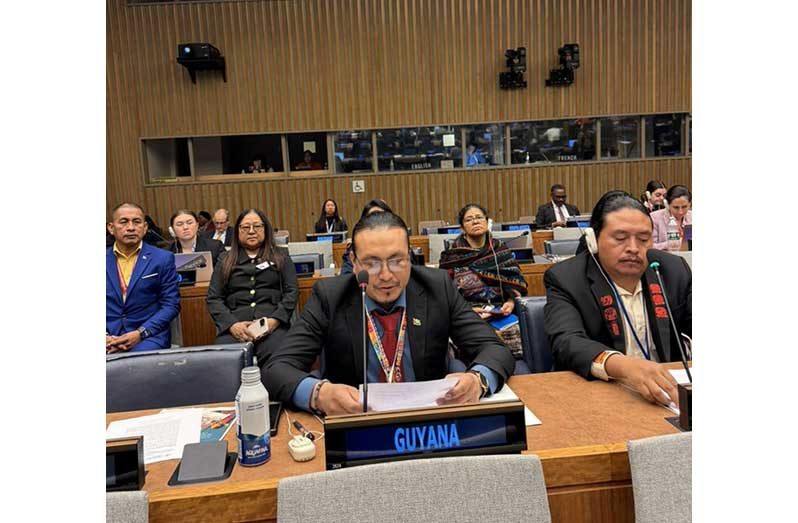GUYANA has reaffirmed its commitment to the rights and development of its Indigenous peoples while defending its record against what it described as false claims made at the 24th Session of the United Nations Permanent Forum on Indigenous Issues (UNPFII).
Delivering a statement on Day 7 of the session under Agenda Item 5(f), Dialogue on Indigenous Platforms established within United Nations entities, Principal Regional Development Officer, Anil Roberts, took the floor on behalf of Guyana, highlighting the country’s inclusive approach to Indigenous representation and development.
“It is with pride and a deep sense of responsibility that I address you today on behalf of my country, Guyana—a nation where Indigenous peoples are not only an indispensable part of our cultural tapestry, but represented and prioritised in our national development,” Roberts said.
He underscored the value of Indigenous platforms within UN bodies, noting their critical role in bridging gaps between Indigenous communities and governments, especially in cases where dialogue is lacking. However, he cautioned the Forum to be vigilant against organisations that misrepresent the truth for access to international funding.
Roberts specifically addressed statements made the previous day by the Amerindian Peoples’ Association (APA), an Indigenous rights NGO in Guyana, stating that the group presented “several untruths” about the reality on the ground.
“Claims that the Minister influences mining activities on Village lands is completely untrue,” Roberts asserted. “The law empowers the Village to collectively approve of extractive activities on Village land.”
He also defended the legal process established under the Amerindian Act for the recognition of District Councils, emphasising that it is based on Free, Prior and Informed Consent (FPIC). According to Roberts, Indigenous leaders in Guyana have raised concerns that the APA has attempted to circumvent this process.
Further, Roberts highlighted the government’s efforts to preserve and promote Indigenous languages. He pointed to the development of a national language policy, integration of Indigenous languages into school curricula, and the Ministry’s enhanced access to justice programme that provides interpretation services in all nine recognised Indigenous languages.
“We are proud that our Indigenous population is largely bilingual,” he noted, adding that these initiatives are helping to mainstream Indigenous cultures and languages within national development.
Roberts also expressed disappointment that the APA continues to refuse engagement with the Government despite repeated offers for dialogue.
“Advancing Indigenous peoples’ rights and development must be underpinned by mutual respect and facts,” he told the Forum. “I urge this Forum and other Indigenous UN platforms to continue to nurture unity and dialogue between Indigenous Peoples and Member States.”
The statement reaffirms Guyana’s broader policy of inclusion, while drawing a clear line against what it describes as misinformation that undermines efforts at meaningful collaboration between Indigenous organisations and the state.
The 24th session of the UNPFII continues this week at UN Headquarters, focusing on a wide range of issues related to Indigenous peoples’ rights, development, and participation in international decision-making.





.jpg)








